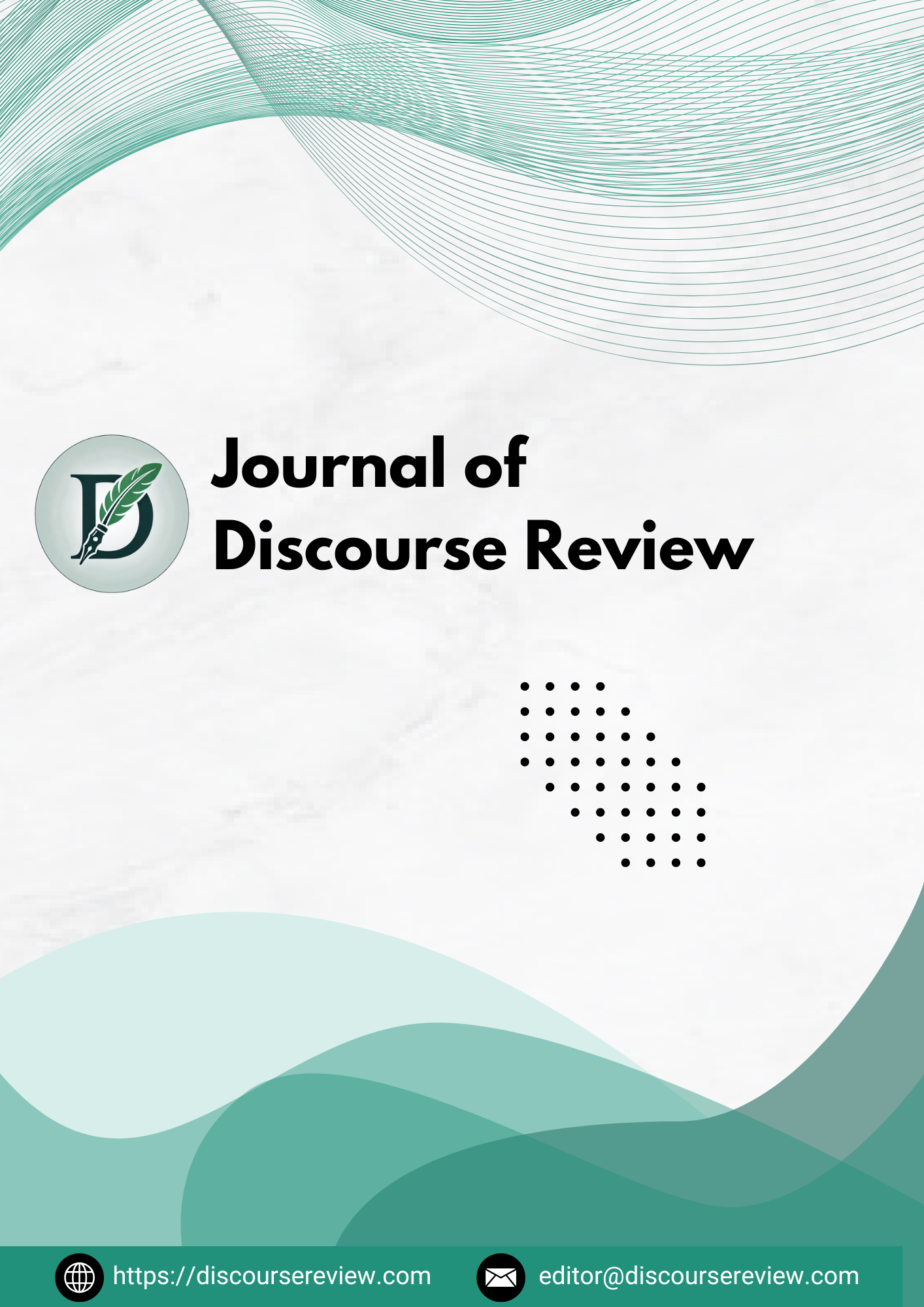
Journal of Discourse Review
Open Access Humanitarian Scholarship
7 days
Time to first decision

Open Access Humanitarian Scholarship
Time to first decision
Volume: 1 Issue: 2
Year: 2025, Page: 209-218,
Received: June 11, 2025 Accepted: June 21, 2025 Published: July 29, 2025
Madhu-Sravani, a traditional folk festival of Mithila, embodies the intricate relationship between women, nature, and cultural heritage through an ecofeminist lens. Rooted in the worship of Shiva, Parvati, and serpent deities, this festival serves as a unique confluence of mythology, folklore, and environmental consciousness. Women play a central role, not only as devotees but also as priests, challenging patriarchal norms and asserting their agency in religious and cultural spaces. The festival’s rituals—ranging from serpent worship to the symbolic use of rare flora—highlight indigenous ecological wisdom and biodiversity conservation. Folktales associated with Madhu-Sravani, such as the story of the Nagakanyas, promote environmental awareness through oral traditions. Additionally, the festival’s folk songs and Behula’s devotion reinforce the deep interdependence of human life and nature, helping preserve collective memory and express the emotional and spiritual dimensions of this tradition. However, certain rituals, such as the Tami practice, also reflect gendered expectations and social constructs of sacrifice. By analysing Madhu-Sravani through the framework of ecofeminism, this paper explores how folklore and cultural traditions can serve as tools for both empowerment and sustainability, offering insights into the resilience of indigenous knowledge systems in the face of modernization and environmental challenges. This study adopts a qualitative approach, drawing on textual analysis, thematic interpretation, and ethnographic insights. It relies on secondary sources—including scholarly articles, research papers, and cultural narratives—to explore the interplay between folklore, gender roles, and ecological consciousness in Mithila’s traditions.
Keywords: Mithila Tradition, Aripana Folklore, Biodiversity conversation, Folk wisdom, Folk Song, Mythology.
ARSD College, University of Delhi. Madhushravani Festival: Rituals and Cultural Significance. YouTube, uploaded by ARSD College,
https://www.youtube.com/watch?v=y4FxAe9R3YU&t=337s&ab_channel=ARSDCollege%2CUniversityofDelhi. Accessed 5 Mar. 2025.
Bakhtin, M. M. (1981). The dialogic imagination: Four essays (M. Holquist, Ed.; C. Emerson & M. Holquist, Trans.). University of Texas Press.
Barber, K. (2007). The anthropology of texts, persons and publics: Oral and written culture in Africa and beyond. Cambridge University Press.
Bhattacharyya, P. (2022). Ecofeminist Consciousness in Select Folktales from Northeast India. Rupkatha Journal on Interdisciplinary Studies in Humanities, 14(2).
Bimal, R. Nepali Sanskriti, Mithila Gaurav ra Rastriyata (Nepalese Culture, Pride of Mithila and Nationality). Seminar paper, Nepal Sanskrit University, Centre for National Cultural Studies, 2070, pp. 1-37.
Chaudhary, R. (2023, July 9). Women in Mithila celebrating Madhushravani. MyRepublica: Nagarik Network.
Dwivedi, A. (2020). Folk traditions and gendered practices: Rethinking reform in the contemporary context. Indian Folklore Research Journal, 17(2), 45–62.
Said, E. W. (1993). Culture and imperialism. New York, NY: Alfred A. Knopf.
Gaon Connection. (2020). Bihar’s Madhushravani festival of new brides, laughter, snake goddesses, and rituals that fuse ecology and tradition. Gaon Connection. https://doi.org/10.21659/rupkatha.v14n2.ne20
https://myrepublica.nagariknetwork.com/news/women-in-mithila-celebrating-madhushravani
Jha, M. (1986). Folk Culture and Oral Tradition of Mithila. Delhi: Shree Publishing.
Jha, S. & Jha, R. (2007). Women and Rituals in Mithila: A Study of Folk Practices. Patna: Maithili Research Centre.
Jha, S., & Kumari, P. (2022). “Orality and Tradition: Women's Ritual Practices in Mithila.” Asian Ethnology, 81(1-2), 83–97.
Khushboo, Rani, and Sujit Kumar Soren. "Madhu-Sravani Festival: A Cultural and Ecological Perspective." Received 13 Sept. 2024; revised 21 Oct. 2024; accepted 24 Oct. 2024.
Mandal, N. (2023, July 22). Madhushravani: A festival celebrated by women of Mithila. The Kathmandu Post. Retrieved from [Kathmandu Post website] Accessed on 5 Mar. 2025.
Rath India. (2023, September 8). Madhushravani festival of Mithila: Worshiping of the Naga Deities. Rath India. Retrieved from [rathindia.org] Accessed on 15 Mar. 2025.
Mandal, N. (2023, July 22). Madhushravani: A festival celebrated by women of Mithila. The Kathmandu Post. Retrieved from https://kathmandupost.com/art-culture/2023/07/22/madhushravani-a-festival-celebrated-by-women-of-mithila Accessed on 1 Mar. 2025
Mahmood, S. (2005). Politics of piety: The Islamic revival and the feminist subject. Princeton University Press.
Mallik, A. R., Chaudhary, S., & Shrestha, S. (2020). Useful valuable plants of Maithili community in Eastern Nepal: An ethnobotanical study. Bangladesh Journal of Plant Taxonomy, 27(2), 439-446.
McDaniel, J. (2004). Offering Flowers, Feeding Skulls: Popular Goddess Worship in West Bengal. New York: Oxford University Press.
Parajuli, B. R. (2022). Ritualization of space and body in Mithila folk arts. SIRJANĀ – A Journal of Arts and Art Education, 8(1), 56–64.
https://doi.org/10.3126/sirjana.v8i1.46655
Rani, K., & Soren, S. K. (2024). Madhu-Sravani: A cultural reflection of Maithil Brahmins. World Journal of Advanced Research and Reviews, 13(1), 472–474.
https://doi.org/10.30574/wjarr.2024.13.1.0794
Rani, R. (2023). “Madhu-Sravani: Eco-Feminist Elements in Mithila's Folk Festivals.” Journal of South Asian Folklore and Gender Studies, 5(1), 35–49.
Rismawati, R., Wildan, W., & Oktavinanda, G. (2025). Ecofeminism Identity in The Gayo Folklore. SAWERIGADING, 31(1).
Roy, S. (1999). Narratives of the Serpent Goddess: Folk Religion in Eastern India. Kolkata: K.P. Bagchi.
Singh, Ram Iqbal. (2012) Maithili Lokgeet. Hindi Sahitya Sammelan.
Sinha, V. (2005). "Eco-rituals in Mithila: Women's Roles in Ecological Conservation." Indian Folklore Research Journal, 3(1), 45–60.
Shiva, V. (2016). Staying alive: Women, ecology and development (2nd ed.). London, England: Zed Books.
Urban, H. B. (2001). Songs of Ecstasy: Tantric and Devotional Songs from Colonial Bengal. Oxford University Press.
© 2025 JDR Academic Trust. This is an open-access publication distributed under the terms of the Creative Commons Attribution 4.0 International License (CC BY 4.0). https://creativecommons.org/licenses/by/4.0
Kumari, C. (2025). Madhu-Sravani: An Ecofeminist and Folkloric Perspective on Mithila’s Sacred Traditions. Journal of Discourse Review, 1(2), 209-218.